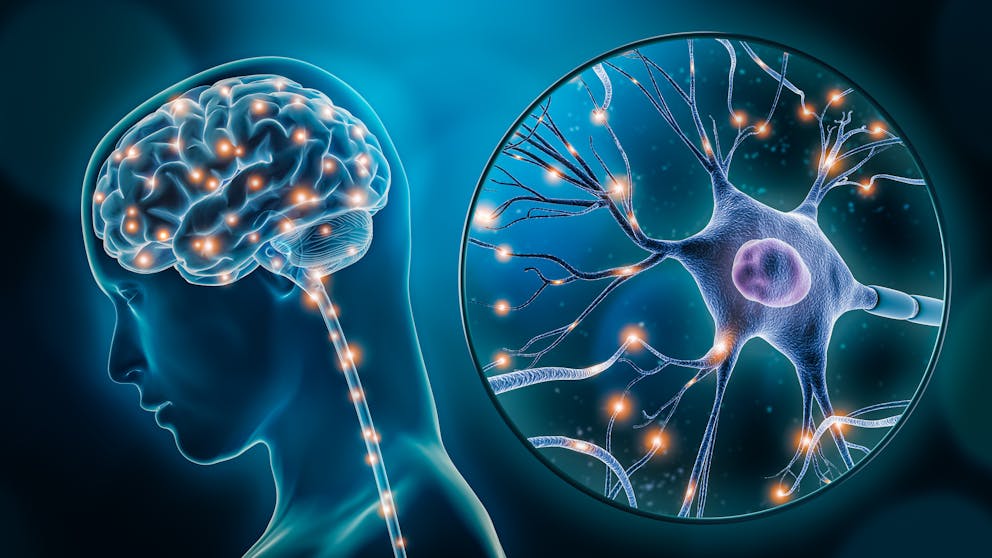The # 1 Dementia Remedy (GAME CHANGER)
The # 1 Dementia Remedy (GAME CHANGER)
Dementia is a heartbreaking reality for millions worldwide, slowly stealing memories and independence. But what if I told you there's hope on the horizon?
The secret sauce in fighting dementia could lie in controlling two hormones – say hello to less luteinizing hormone (LH) and progesterone for healthier brains ahead.
As someone who's watched loved ones battle this cruel disease, I've been on the edge of my seat, eagerly following every new development.
And let me tell you, this latest discovery has made me feel more optimistic than ever. Let's dive into something interesting – can adjusting LH and progesterone open new doors for dementia treatments? Let's dive in!
The Role of Luteinizing Hormone in Dementia
As we age, our bodies undergo numerous changes, some of which can significantly impact our cognitive function. One such change is the increase in luteinizing hormone (LH) levels, which has been linked to age-related cognitive decline and dementia.
Have you heard? Researchers are now investigating how much of an impact LH may have on developing or advancing brain disorders—yes, I’m talking about ones as serious as Alzheimer’s.
By examining LH's link with cognitive slip-ups, we start seeing potential paths for treating dementia that involve turning down this hormone's volume.
Understanding Luteinizing Hormone and Cognitive Decline
Luteinizing hormone, produced by the pituitary gland, plays a crucial role in regulating the reproductive system. However, as we age, LH levels tend to increase, particularly in postmenopausal women.
This surge in LH has been associated with various aspects of cognitive decline, including neuroinflammation and synaptic dysfunction.
Research has shown that elevated LH levels can contribute to the accumulation of amyloid-beta plaques and neurofibrillary tangles, two hallmarks of Alzheimer's disease.
Additionally, LH has been found to disrupt the normal functioning of synapses, the critical junctions between nerve cells that facilitate communication and memory formation.
A study published in the journal Neurobiology of Aging revealed that patients with Alzheimer's disease had significantly higher levels of LH compared to those with normal cognitive function.
This finding suggests that LH may not only be a consequence of age-related hormonal changes but also a potential contributor to the development of dementia.
Lupron's Role in Dementia Symptom Reduction
Lupron, a drug commonly used to suppress sex hormones in the treatment of conditions like prostate cancer and endometriosis, has shown promise in reducing dementia symptoms by targeting LH levels.
Taking a closer look, Lupron could be our hero in toning down the bad vibes LH sends to our brain functions by keeping its production on the low.
In a cool study by the University of Utah team, Alzheimer's patients treated with Lupron showed impressive gains in remembering stuff and thinking clearly compared to those who just got a dummy pill.
The study, published in the Journal of Alzheimer's Disease, suggests that suppressing LH levels may be a viable therapeutic approach for managing dementia symptoms.
While more research is needed to understand the long-term effects of Lupron on cognitive health fully, these initial findings offer hope for individuals struggling with dementia and their families.
By targeting the underlying hormonal imbalances that contribute to cognitive decline, we may be able to develop more effective and targeted therapies for this devastating condition.

Progesterone's Protective Effects on the Brain
While much attention has been given to the role of estrogen in brain health, another important hormone, progesterone, has been shown to have significant neuroprotective properties.
Progesterone doesn't just sit around; it gets busy supporting the growth of neurons, cooling off inflamed areas in the brain, and tackling dementia head-on.
Recent studies have shed light on the multifaceted benefits of progesterone, not only for brain health but also for overall well-being.
Peeling back the layers of what makes progesterone such a good guardian gives us fresh ideas on keeping nasty neurological conditions at bay.
Progesterone as a Neurosteroid
Progesterone, often associated with its role in the female reproductive system, is also a potent neurosteroid that exerts a wide range of effects on the brain.
This hormone is synthesized not only in the ovaries but also in the brain itself, highlighting its importance in maintaining optimal cognitive function.
Research has shown that progesterone promotes neurons' growth and survival, particularly in brain regions associated with learning and memory, such as the hippocampus.
By stimulating the production of brain-derived neurotrophic factor (BDNF), progesterone helps create new neural pathways and strengthens existing ones, enhancing cognitive performance.
Moreover, progesterone has been found to have significant anti-inflammatory properties in the brain. You know how fires spread? Well, in neurodegenerative diseases like Alzheimer’s, inflammation is what keeps adding wood to that blaze.
Think of progesterone as a guardian for your gray matter, reducing inflammation inside your head that could otherwise lead to harm while taking it easy on cognitive decline.
Benefits Beyond Brain Health
The neuroprotective effects of progesterone extend beyond its role in preventing age-related cognitive decline.
Studies have shown that women with higher progesterone levels have fewer adverse effects from traumatic brain injury (TBI) and exhibit less addictive behaviors.
In a study published in Frontiers in Neuroscience, researchers found that progesterone treatment following TBI reduced inflammation, prevented cell death, and improved functional recovery in animal models.
These findings suggest that progesterone may have therapeutic potential in treating brain injuries and other neurological conditions. Additionally, progesterone has been shown to have a positive impact on addiction behaviors.
A study published in the Journal of Addiction Medicine revealed that women with higher progesterone levels had lower rates of substance abuse and were more likely to maintain sobriety during addiction treatment.
The multifaceted benefits of progesterone highlight the importance of maintaining optimal hormone balance for overall health and well-being.
By exploring strategies to enhance progesterone levels, we may be able to protect the brain from age-related cognitive decline and improve outcomes in a variety of neurological and behavioral conditions.
Enhancing Progesterone Levels Through Melatonin and Supplements
While the benefits of progesterone for brain health are clear, finding safe and effective ways to enhance progesterone levels can be challenging.
Hormone replacement therapy may not be suitable for everyone, and the long-term effects of exogenous progesterone supplementation are still being studied.
Fortunately, there are alternative methods to increase progesterone levels indirectly, such as suppressing luteinizing hormone (LH) through melatonin supplementation and other hormonal support strategies.
By exploring these natural approaches, we may be able to harness the neuroprotective effects of progesterone without the potential risks associated with direct hormone replacement.

Melatonin's Indirect Impact on LH and Progesterone
Melatonin, a hormone primarily known for its role in regulating sleep-wake cycles, has been found to have a surprising effect on LH levels.
Studies have shown that melatonin supplementation can indirectly suppress LH production, which in turn may lead to an increase in progesterone levels.
A study published in the Journal of Pineal Research found that melatonin administration in postmenopausal women significantly reduced LH levels and increased progesterone levels.
According to these scientists, melatonin may be playing puppeteer with our hormones by messing around with their main control system.
While more research is needed to fully understand the optimal dosage and timing of melatonin supplementation for enhancing progesterone levels,
initial findings suggest that taking melatonin in higher dosages (75-125 mg) before bed may be beneficial for individuals with dementia or those at risk of cognitive decline.
Supplemental Support for Hormonal Balance
In addition to melatonin, other supplements may help support optimal hormone balance and enhance progesterone levels.
Two such supplements are dehydroepiandrosterone (DHEA) and pregnenolone, which are precursors to progesterone and other important steroid hormones.
DHEA, often called the "mother hormone," has been shown to impact cognitive function and mood positively.
A study published in the Journal of Steroid Biochemistry and Molecular Biology found that DHEA supplementation improved memory and learning in animal models of Alzheimer's disease.
Interestingly, pregnenolone might be a brain's best friend since it can protect nerve cells and lower swelling inside our heads.
A study published in the Journal of Neuroinflammation showed that pregnenolone treatment reduced neuroinflammation and improved cognitive function in aged rats.
Imagine mixing up your hormone support strategy by adding ingredients like DHEA and pregnenolone to the recipe.
Throw in a bit of melatonin and shake it up with healthy habits, and you've got yourself a natural boost for your progesterone levels—keeping your brain sharp as time ticks on.
Conclusion
Suppressing luteinizing hormone and progesterone in dementia treatment is a game-changer. By targeting these hormones, we can significantly reduce symptoms, protect brain health, and give hope to millions affected by this devastating disease.
Imagine a world where we can slow down cognitive decline, preserve precious memories, and maintain independence for longer. That's the promise of this groundbreaking approach.
The road ahead is filled with more research, trials, and hard work. So, equipped with these understandings, stepping into a better day for people facing dementia alongside their family members just got easier.
So let's keep pushing forward, advocating for further studies, and spreading the word about the incredible potential of suppressing LH and progesterone. Together, we can make a real difference in the fight against dementia.
Supporting Data
https://pubmed.ncbi.nlm.nih.gov/25310993/
https://en.wikipedia.org/wiki/Progesterone
https://www.ncbi.nlm.nih.gov/pmc/articles/PMC9853463/
https://www.ncbi.nlm.nih.gov/pmc/articles/PMC9789006/
https://www.lifeextension.com/magazine/2017/11/dhea-protects-the-aging-mind
Previous blog
What Happens If You Drink Celery Juice for 7 Days
Popular
08/21/2024
55.7K views
02/23/2025
46.8K views
11/18/2024
281.1K views
03/18/2024
11/21/2022




